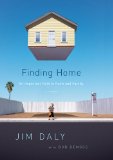
The book Finding Home: An Imperfect Path to Faith and Family is primarily about Jim Daly’s young life. It’s not until pg. 173 he even turns thirteen years old. However, he sure went through the ringer as a kid!
The part of his story which was most winsome to me was the day his mother died:
-
“To say I had been unprepared for the events of that day would be a gross understatement. It’s as if the instant I got up that morning, I’d been swept away by a whirlwind of chaos. Seeing my dead mother’s body. Watching my siblings cry. Standing by the grave… Coming home to an empty house. Discovering that Hank had sold everything – and left us with nothing. Mike preparing to leave. Getting the news that Aunt Penny’s husband was dying… I hit rock bottom. I couldn’t handle another thing. I was officially an orphan without a place to live or food to eat.” (pg 85)
Later that night Jim’s brother Mike left to go back to the Navy: “After Mike left for his ship, Dave, Dee Dee, Kim, and I made the best of our circumstances and settled in for the night. We huddled together on the carpeted floor in the living room. We had no pillows or blankets to pull over us…” (pg 90)
Reading through that account left an ache in my heart. I tried imagining what it would be like to, on the same day my mother died, also have my crazy step-father abandon me. No role model or authority figure left to hug me and say, “Don’t worry, everything will be allright.” Then also on the same day, my idolized brother leaves: back to war, to Vietnam. Lastly, imagining the curtain of a day like that closing, finality setting in, and in place of comfort instead being left in an empty house to sleep on a hard floor. Makes me hurt for the poor guy!
Besides the drama of the story, here are a few things I took from the book:
First, once again, a reminder of the dead end road alcohol leads. For Jim’s dad, the “bottle” took him down a long path of pain, separation from his wife and family, guilt and regret beyond description, and eventually an ignominious death in an abandoned laundromat. Incredibly sad.
Another thing that struck me from the book was the deep seated need Jim had for positive role models: particularly male. As a youngster Jim grasped at every potential straw. Because they cared, some of his teachers – especially his karate instructor and football coach – were influential. This was encouraging to me as I’ll be working closely with a number of young people this semester. Who knows? Maybe I’ll have the opportunity to invest in someone going through a rotten situation like Jim’s. Only God can change lives, but isn’t it exciting to know we can be a vehicle for showing God’s love to others?
While reading the book I sometimes wished he would have shared more what he was “thinking” in the midst of all his crazy experiences. I’ll give it to him though that as a kid he was most likely more concerned with “reacting and surviving” than “thinking.”
Towards the end, Jim did give some reflections. I suppose that sometimes it can be too difficult to relate what we are feeling and thinking and maybe it is… just enough that we learn something. I think Jim learned some things:
-
“…I can say with certainty, God is near to those who hurt… Being broken is very real to me. I think it’s a good state for the human heart to be in – at least for a season. I’ve found that when I am broken, I can finally understand how totally dependent I am on God.”
“…If I were to take what they did to me and drag it around like a ball and chain of resentment, guess who would still be in jail? Me. But, as I forgive them and when I don’t attempt to ‘own’ any of the destructive decisions or actions they made toward me, then I’m free. I don’t have to live my life peering into the rearview mirror. In fact, I feel stronger when I release what was done to me. How? The space in my heart that had been preoccupied with anger or hurt can be set aside to make room for a joy and a peace that makes no sense whatsoever -because God promises that gift to the brokenhearted.”
Did you notice Jim’s story was the story of a victim treated badly? As a victim, God has given Jim the ability to forgive and move on. In fact, God has become a Father to Jim in the place of his own. However, I noticed there wasn’t a whole lot in the book about Jim as the sinner, needing salvation from himself.
It’s always much worse to be a perpetrator than a victim. Nick the victim turns to God asking for deliverance. Nick the perpetrator turns to God in shame and asks for forgiveness. Nick the “one man army” always falls flat on his face! When I’m treated badly, it hurts… but when I’m humbled due to my own selfish decisions, it hurts even worse. Every day I’m convinced once again I need God to save me from myself.